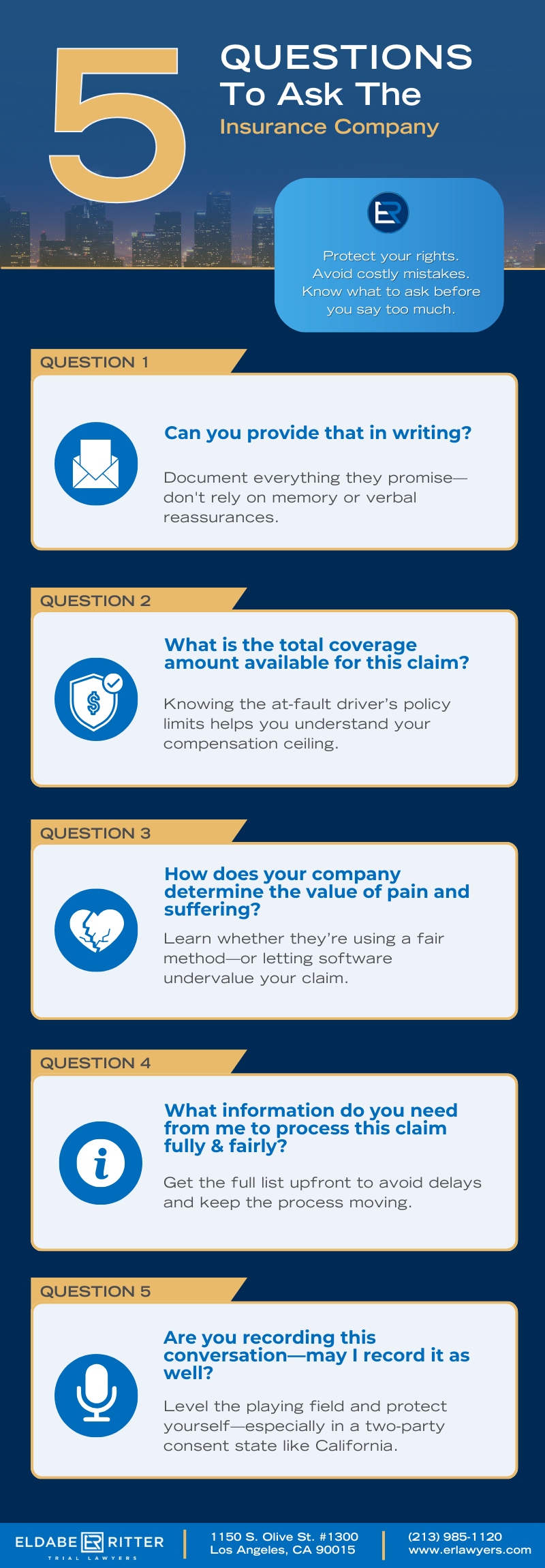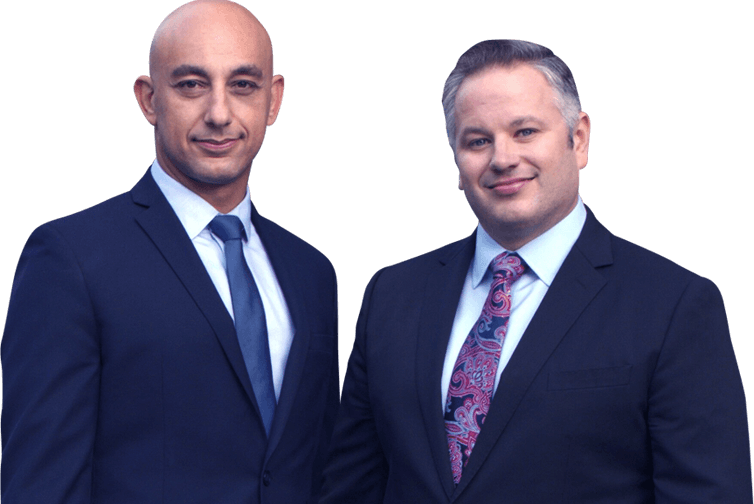As a personal injury law firm, our attorneys have spent over fifty years combined representing car accident victims throughout California. We’ve become privy to countless interactions between injured individuals and insurance companies.
One thing is abundantly clear: what you say to insurance representatives in the days and weeks following a serious accident can significantly impact your case and recovery.
Insurance companies are businesses with a primary goal of minimizing payouts. Their representatives are trained to seem helpful and friendly, but their questions are often designed to elicit responses that can later be used to reduce your compensation.
This isn’t to say all insurance reps are malicious—they’re simply doing their job. Your job, however, is to protect your interests.
Our job, as personal injury lawyers, is to help equip you with strategic questions to ask the insurance company after a car crash to protect your rights and improve your chances of fair compensation. These questions can help level the playing field and potentially protect your right to fair compensation.
Here are five important questions to ask the insurance company after a car crash to protect your case and avoid common pitfalls.
Question #1: “Can you provide that in writing?”
After any conversation with an insurance representative where they make promises, provide information about coverage, or explain the claims process, always follow up with this simple but powerful question.

Why this matters: Verbal commitments can be disputed later or “forgotten” during the claims process. Having information in writing creates a paper trail that can be invaluable if disputes arise.
When to use it: Use this question after the representative:
- Confirms specific coverage amounts
- Promises to pay for certain expenses
- Explains the timeline for claim processing
- Makes any statements about liability or fault determinations
Example: “You’ve mentioned that my policy covers rental car expenses for up to 30 days. Can you please provide that in writing, along with the daily coverage limit?”
Recommended Reading: What Should I Do After A Car Accident With a Rental Car?
Getting written confirmation transforms vague promises into documented evidence. It also signals to the insurance company that you’re organized and attentive to details—qualities that discourage misrepresentation.
Question #2: “What is the total coverage amount available for this claim?”
Although not obligated to automatically disclose policy limits to third parties, California insurers may do so with written permission from their insured. This is especially likely in cases of serious injury or when insurers aim to prevent future allegations of bad faith.
This straightforward question is meant to uncover the maximum insurance coverage available to compensate you for your injuries and damages. Knowing this amount helps you (and your attorney) see the full picture of your claim’s potential value and limitations.

Why this matters: Knowing the policy limits helps you understand the potential range of compensation available. It also helps you and your attorney develop appropriate expectations and strategies. Asking this early is one of the most important questions to ask the insurance company after a car crash, especially if your injuries are serious.
When to use it: Ask this question early in the process, ideally in your first meaningful conversation with the insurance representative.
Example: “Before we talk about the specifics of my claim, could you give me the total coverage amount available under this policy for my accident?”
It’s very likely that they will not reveal this information at this point, your next step should be to make the request in writing.
Here’s how, as a third-party claimant, you can formally request the policy limits of the at-fault party’s insurance. Send a written request along with the following:
- A copy of the police report (if any), or other documentation of the accident.
- The insured’s name (the at-fault driver).
- Date and location of the accident.
If an insurance adjuster refuses to disclose the limits, that doesn’t mean you’re out of options. An experienced personal injury attorney may be able to pressure the insurer to reveal this information—or use their refusal to your advantage in negotiations or litigation.
Question #3: “How does your company determine the value of pain and suffering damages?”
While economic damages like medical bills and lost wages have clear documentation, non-economic damages such as pain and suffering are more subjective. This question helps uncover the insurer’s approach to these important but less tangible damages.

Why this matters: Pain and suffering compensation can form a substantial portion of your overall claim value but is often undervalued by insurance companies. Understanding their calculation method helps you identify potential lowball offers.
When to use it: Ask this when the conversation turns to settlement amounts or when the representative begins discussing how your claim will be valued.
Example: “I understand that compensation includes both economic and non-economic damages. Can you explain specifically how your company calculates the value of pain and suffering in cases like mine?”
The representative’s answer will reveal much about the company’s approach. Some may use a multiplier of medical expenses, while others use per diem calculations or computer programs. Their explanation—or reluctance to explain—can help you gauge how fairly they’re likely to treat your non-economic damages.
The Methods Insurance Companies Use to Put a Dollar Value on Your Pain & Suffering
Understanding how insurers calculate pain and suffering is key when preparing your list of questions to ask the insurance company after a car crash.
Multiplier Method
They total your economic damages (like medical bills and lost wages), then multiply that number by a factor—usually between 1.5 and 5, depending on the severity of your injuries.
Example: $20,000 in medical bills × 3 multiplier = $60,000 for pain and suffering
Per Diem Method
Assigns a daily dollar value to your pain and suffering, then multiplies it by the number of days you experienced the pain.
Example: $200/day × 180 days = $36,000 for pain and suffering
Insurance Software Method
Most large insurance companies use software to evaluate claims. They input injury codes, treatment types, and other data points, and the system spits out a standardized value.
Whether it’s a multiplier, a per diem amount, or a computer algorithm, each method attempts to put a price tag on something that’s deeply personal: the way your injuries have changed your life. These tools might account for how long you were in treatment or how much you spent on medical care—but they often miss the emotional toll, the loss of independence, and the day-to-day challenges you never expected to face.
That’s why telling your story—and having someone who knows how to fight for the full picture—can make all the difference in your claim.
Question #4: “What specific information do you need from me to process this claim fully and fairly?”
This proactive question puts the ball in the insurance company’s court to identify all necessary documentation up front.

Why this matters: Insurance companies sometimes delay claims by requesting information piecemeal. By asking for a comprehensive list early, you can gather everything at once and potentially avoid unnecessary delays.
When to use it: Ask this question in your initial conversations, after reporting the accident but before you begin submitting documentation.
Example: “Could you please tell me exactly all that I need to get you for my claim to be reviewed quickly and fairly?”
Request this list in writing. Having a documented record of what was requested can prevent the insurance company from claiming later that you failed to provide necessary information.
Recommended Reading: Protecting Your Claim From Insurance Fraud Car Accidents
Question #5: “Are you recording this conversation, and may I record it as well?”
Insurance representatives often record phone calls without explicitly mentioning it. This question acknowledges this practice and establishes mutual transparency.

Why this matters: Recorded conversations can be powerful evidence if disputes arise about what was said. By recording conversations yourself (where legally permitted), you create an independent record that can protect your interests.
When to use it: Ask this question at the beginning of substantive phone conversations, especially when discussing fault, coverage details, or settlement offers.
Example: “Before we continue this discussion, I’d like to confirm whether you’re recording this conversation. If so, I’d like to record it as well to ensure we both have the same record of our discussion.”
In California, both parties must consent to recording a conversation, so the representative must inform you if they’re recording. If they are recording, they cannot reasonably object to you doing the same. If they claim they aren’t recording but refuse to allow you to record, this could be a red flag.
Important note: Before recording any conversation, familiarize yourself with your state’s recording consent laws. California requires all parties to consent to recording (two-party consent), but laws vary by state.
Once you’ve asked these questions to ask the insurance company after a car crash, it’s important to continue protecting yourself throughout the claims process.

Play It Smart: What to Do After Asking the Insurance Company the Right Questions
Asking the right questions is just one aspect of protecting yourself after an accident. Here are some additional tips:
- Be careful about providing recorded statements without first consulting an attorney, especially for serious accidents. These statements can be used to minimize your claim later.
- Avoid discussing fault or accepting blame, even partially. Determining fault in an accident is complex and should involve a full investigation.
- Don’t rush to settle quickly. Early settlement offers are often lower than what your claim is truly worth, especially before you understand the full extent of your injuries.
- Keep detailed records of all communications with insurance companies, including names, dates, and the content of conversations.
- Consider consulting with a personal injury attorney before engaging in substantive discussions with insurance representatives, particularly if your injuries are significant.
Recommended Reading:
* 6 Questions You Don’t Want to Answer After an Accident
* What to do After a Car Accident When You are Not At Fault
* How to Handle Investigative Calls From Insurance Adjusters
When It’s Worth Getting a Lawyer on Your Side
While these questions can help you navigate conversations with an insurance company more effectively, they’re not a substitute for legal representation in serious accident cases. Consider consulting with a personal injury attorney if:
- You’ve suffered significant injuries requiring extensive medical treatment
- You’ve missed substantial time from work
- The insurance company is disputing liability
- You’re receiving pressure to accept a quick settlement
- Your claim involves complex issues like multiple potentially liable parties
An experienced attorney can handle insurance communications on your behalf, ensure all deadlines are met, properly value your claim, and fight for fair compensation while you focus on recovery.
The aftermath of a serious car accident is challenging enough without having to navigate complex insurance processes. By asking these five strategic questions, you can better protect your rights and position your claim for fair evaluation.
These five strategic questions to ask the insurance company after a car crash can go a long way in leveling the playing field.
Remember that knowledge and documentation are powerful tools when dealing with insurance companies. Stay organized, be persistent, and don’t hesitate to seek professional guidance when needed.
Connect With an Experienced Car Accident Lawyer for a Free Case Evaluation

If you’ve been seriously injured in a motor vehicle accident in California, our experienced car accident attorneys are here to protect your rights. Let us deal with the insurance company—so you don’t have to.
Don’t let the insurance company control the narrative. Speak to an experienced car accident lawyer before giving a recorded statement or accepting a settlement offer.
Reach out for a free consultation. No pressure, just answers.
Disclaimer: The information provided in this blog post is not intended as legal advice and should not be relied upon as such. You should consult with an experienced attorney for advice on your specific situation.
